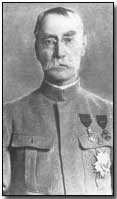Primary Documents - The Battle of Ourcq River - The Battle of Ourcq River - General Clergerie's Account, 5-8 September 1914
 Reproduced below is an account
of the background to the French decision to attack the German First Army in the
flank as the latter headed towards Paris in early September 1914.
Reproduced below is an account
of the background to the French decision to attack the German First Army in the
flank as the latter headed towards Paris in early September 1914.
The French attack, which became known as the Battle of Ourcq River, served to surprise and then halt Alexander von Kluck's First Army, and served as an immediate precursor to the successful Allied counter-attack at the First Battle of the Marne. Taken together the battles first halted the German advance upon Paris, and then threw the German Army into temporary retreat.
With the German attack upon Paris - and therefore the Schlieffen Plan - ending in failure, both sides dug into prepared positions, an act which signalled the start of several years of largely static trench warfare.
The memoir below was written by General Clergerie, Chief of Staff to the Military Governor of Paris, General Gallieni. It was Gallieni who initiated French strategy in launching the Ourcq attack.
Click here to view French Army Commander-in-Chief Joseph Joffre's proclamation issued following French success at the Ourcq. Click here to read German Army Chief of Staff General von Moltke's reaction.
Memoir of the Battle of Ourcq River (5-8 September 1914) by General Clergerie, General Gallieni's Chief of Staff
From August 26, 1914, the German armies had been descending upon Paris by forced marches.
On September 1st they were only three days' march from the advanced line of the entrenched camp, which the garrison were labouring desperately to put into condition for defence.
It was necessary to cover with trenches a circuit of 110 miles, install siege guns, assure the coming of supplies for them over narrow-gauge railways, assemble the food and provisions of all kinds necessary for a city of 4,000,000 inhabitants.
But on September 3rd the intelligence service, which was working perfectly, stated, about the middle of the day, that the German columns, after heading straight for Paris, were swerving toward the southeast and seemed to wish to avoid the fortified camp.
General Gallieni and I then had one of those long conferences which denoted grave events: they usually lasted from two to five minutes at most. The fact is that the military Government of Paris did little talking - it acted. The conference reached this conclusion: "If they do not come to us, we will go to them with all the force we can muster."
Nothing remained but to make the necessary preparations. The first thing to do was not to give the alarm to the enemy. General Maunoury's army immediately received orders to lie low and avoid any engagement that was not absolutely necessary.
In the night of September 3rd, knowing that the enemy would have to leave only a rear guard on one bank of the Ourcq, General Gallieni decided to march against that rear guard, to drive it back with all the weight of the Maunoury army, to cut the enemy's communications, and take full advantage of his hazardous situation.
Immediately the following order was addressed to General Maunoury:
"Because of the movement of the German armies, which seem to be slipping in before our front to the southeast, I intend to send your army to attack them in the flank, that is to say, in an easterly direction. I will indicate your line of march as soon as I learn that of the British Army. But make your arrangements now so that your troops shall be ready to march this afternoon and to begin a general movement east of the entrenched camp to-morrow."
General Joffre gave permission to attack and announced that he would himself take the offensive on the 6th. On the 5th, at noon, the army from Paris fired the first shot; the battle of the Ourcq, a preface to the Marne, had begun.
General von der Marwitz, cavalry commander of the German First Army, made intemperate use of the wireless telegraph and did not even take the trouble to put into cipher his dispatches, of which the Eiffel Tower made a careful collection. In the evening of September 9th, an officer of the intelligence corps brought me a dispatch from this same Marwitz couched in something like these terms: "Tell me exactly where you are and what you are doing. Hurry up, because XXX."
The officer was greatly embarrassed to interpret those three Xs. Adopting the language of the poilu, I said to him: "Translate it, 'I am going to bolt.' "
True enough, next day we found on the site of the German batteries, which had been precipitately evacuated, stacks of munitions; while by the roadside we came upon motors abandoned for the slightest breakdown, and near Betz almost the entire outfit of a field bakery, with a great store of flour and dough half-kneaded.
Paris and France were saved. Von Kluck could not get over his astonishment. He has tried to explain it by saying he was unlucky, for out of a hundred Governors not one would have acted as Gallieni did, throwing his whole available force nearly forty miles from his stronghold. It was downright imprudence. Of course, it was Gallieni who was in the wrong!
Source: Source Records of the Great War, Vol. II, ed. Charles F. Horne, National Alumni 1923
"ANZAC" was coined in 1915 from the initials of the Australian and New Zealand Army Corps.
- Did you know?
